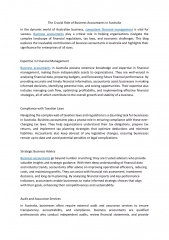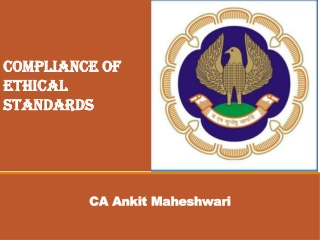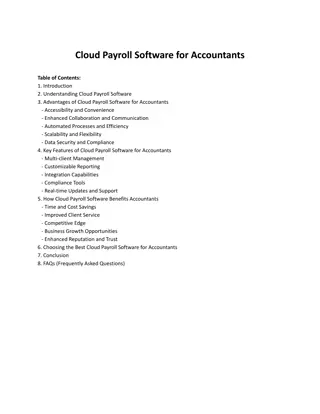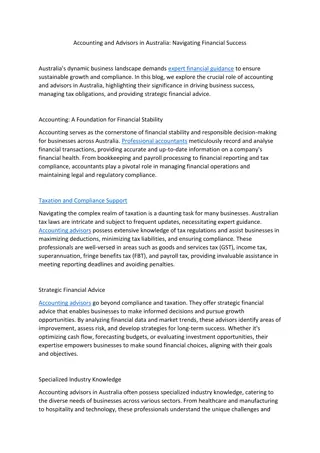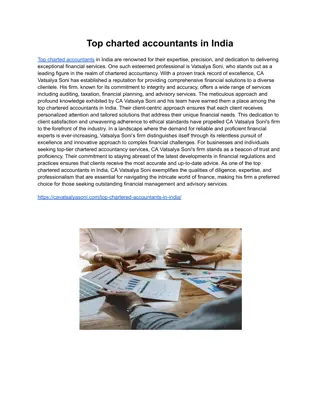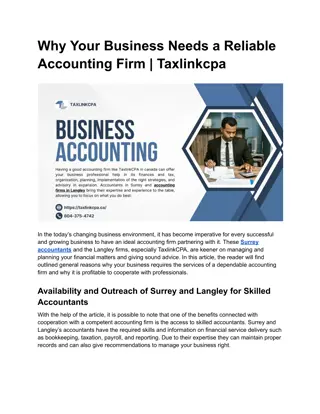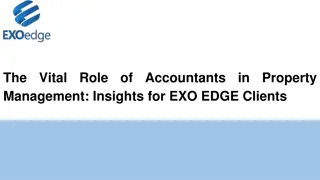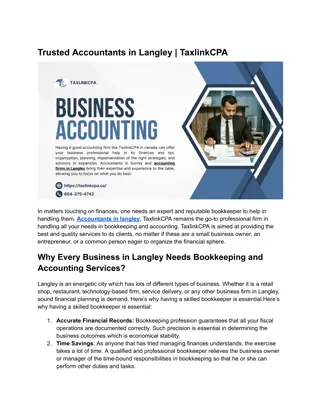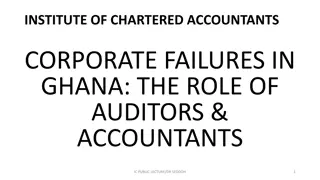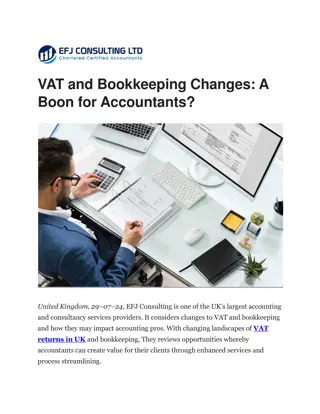
Role of Accountants in Organizations
Accountants play crucial roles in organizations, from bookkeeping to financial analysis. They are essential for financial efficiency and accuracy, offering services such as auditing, tax preparation, and consulting. Public accountants, in particular, require additional certifications to serve various companies and issue financial statements. Understanding the different types of accounting functions and roles within a company is key to maintaining profitability and compliance.
Download Presentation

Please find below an Image/Link to download the presentation.
The content on the website is provided AS IS for your information and personal use only. It may not be sold, licensed, or shared on other websites without obtaining consent from the author. If you encounter any issues during the download, it is possible that the publisher has removed the file from their server.
You are allowed to download the files provided on this website for personal or commercial use, subject to the condition that they are used lawfully. All files are the property of their respective owners.
The content on the website is provided AS IS for your information and personal use only. It may not be sold, licensed, or shared on other websites without obtaining consent from the author.
E N D
Presentation Transcript
Accounting A NEPRIS PRESENTATION APRIL 24, 2017
ABOUT ME I have been a CPA (Certified Public Accountant) since 1987. I started in high taking business courses and my parents encouraged me to be an accountant. While I was going to college, I managed to secure a part-time job in accounting with a friend of the family who owned a CPA practice. At the time I started working in the CPA firm, I had no idea what types of work CPAs performed.
Bookkeepers and Account Clerks Different types of accounting functions in a larger organization or are considered Industry accounting Most of these are considered bookkeeping type functions with the exception of Internal Auditor and Chief Financial Officer (CFO). Accounts Payable Accounts Receivable Payroll, Human Resources (HR) Inventory, Shipping & Receiving
Accountants Accountants usually will have their degree in accounting or business administration. Work within one company Internal Auditor Chief Financial Officer or Controller Financial Analyst
Additional roles 2 3 4 1 In addition to preparing taxes for individuals, public accountants can also perform audits, prepare taxes and provide consulting for corporations, nonprofit organizations and governments. Internal accountants create processes to find and eliminate financial waste and fraud. Management accountants record and analyze financial information. Government accountants at the federal, state or local level maintain records of government agencies and audit private businesses or individuals whose activities fall under government regulation or taxation.
Public Accounting Public Accounting requires an extra level of certification with a license from the state. Allows you to practice as a Certified Public Accountant and serve many different companies. You can own your own firm or you can work for a CPA firm. CPAs are the only ones who can issue a financial statement. There are many other types of work that CPAs perform such as audits, fiduciary accounting, forensic accounting and more. Other Free Lance Bookkeepers
Your role as an employee Employees are part of a team in order to help the company stay profitable so that you can continue to have a job. Those who have a financial responsibility ie, bookkeepers, account clerks, internal auditors, information technology (IT) departments and sales people all need to understand some of the accounting in order for them to give accurate data to the accounting department. The financial analyst gathers the data from all of the different departments to determine the performance of the company. I will be showing you later in the presentation how all of the data comes together.
The role of a CPA Most larger companies who make $250K or more in gross revenues will usually hire a CPA to help them. In my company, I work with entrepreneurs in various different ways. Taxes, bookkeeping, tax planning, and business strategies. As an outside CPA, we also perform audits on companies who are required to have an audit. Audit is reviewing the company records to ensure that the data is accurate and presented in a financial statement so that it is not misleading to an investor or bank.
The accounting process using technology General Ledger encompass assets, liabilities, equity, income and expenses. Petty Cash Payroll process Accounts Payable Accounts Receivable Inventory and Cost of Good Sold (COGS) Use of accounting software small companies vs. large companies
Final Notes Every company or business must have some type of accounting. The job market - Accountants and Auditors. Employment of accountants and auditors is projected to grow 11 percent from 2014 to 2024, faster than the average for all occupations. A CPA salary is pretty hard to beat. New industries, more sophisticated technologies, and expanding opportunities for the business add up to better opportunities for CPAs. Depending on firm size and location, the average starting salaries in public accounting range from $40,000 to $57,500. Those with a graduate degree and the CPA certification can expect to earn 10 to 15 percent extra then the average starting salaries. The more knowledgeable and more expertise, the higher your demand and available job opportunities.
Demand for the accounting profession Continuing demand is good news for CPAs. It means career stability, excellent compensation, increased mobility, and continued career growth opportunities. Several factors have combined to sustain demand for CPAs. Corporate Scandals and an Intense Focus on Business Ethics Intense focus on corporate accountability as a result of widespread fraud and wrongdoing continues to fuel demand for CPAs. Companies must now meticulously scrutinize every aspect of the entire accounting process, and corporate leaders many of whom are not accounting experts must personally attest to the integrity of their financial statements. Expanded and more stringent regulations also mean government agencies are hiring CPAs to monitor how well companies comply. The Global Economy and a Move Toward International Reporting Standards The global economy and proliferation of multi-national organizations increases the demand for CPAs both internationally and domestically. The world marketplace today needs experts who understand everything from international business ethics to International Financial Accounting Standards. CPAs who can adapt to other cultures and understand global business perspectives and regulations are extremely valuable. Business Complexity and Constantly Advancing Information Technology New business models, more complex information, and evolving technology mean CPAs with solid IT skills are needed to design, integrate, and implement advanced software systems. They are also needed to serve as consultants to link technology solutions with sound business practices. Projected Retirements of a Large Number of CPAs in the Near Future According to the AICPA, 75 percent of today s CPAs by and large the baby boomers will be retiring within the next 15 years. As they leave full-time active practice, the demand for qualified CPAs to fill the ranks will continue to increase. A side effect of an aging population in general is an increased need for CPAs to assist in retirement planning.

